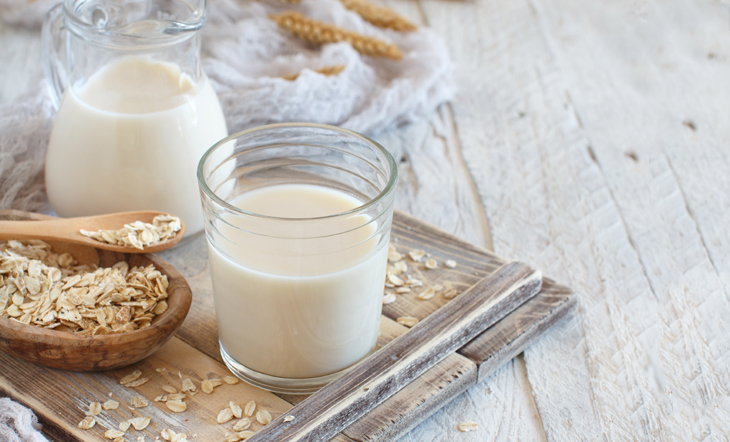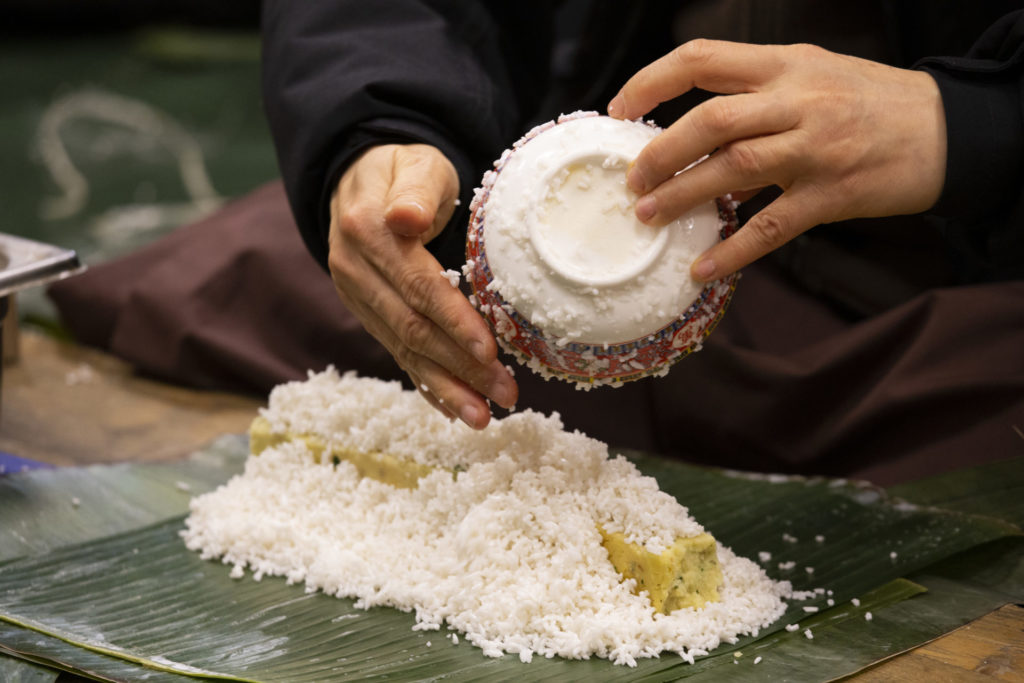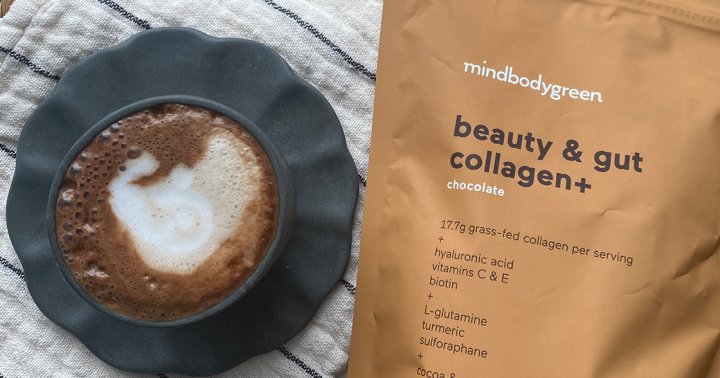Is Oat Milk Actually Healthy? 5 Pros and Cons of the Popular Non-Dairy Milk Alternative
Oat milk: everywhere you go, from Starbucks to local coffee shops, oat milk is on the menu and in everyone’s coffee. But is this non-dairy milk alternative good for you? How do the nutritional benefits of oat milk vs....

Oat milk: everywhere you go, from Starbucks to local coffee shops, oat milk is on the menu and in everyone’s coffee.
But is this non-dairy milk alternative good for you? How do the nutritional benefits of oat milk vs. actual oats or other non-dairy milks compare?
In other words, is oat milk as healthy as it is popular, and should it be a staple or a passing trend?
Oat milk is certainly not the only – or the first – dairy milk alternative. Soy milk and rice milk were earlier pioneers in the non-dairy milk world, followed by the almond milk craze. So these other non-dairy options paved the way for the oat milk craze.
Try This Easy DIY Almond Milk Recipe at Home!
Let’s take a closer look and learn exactly what’s going on behind that creamy flavor and oh-so smooth texture in your latte.
Here Are 3 Top Benefits (Pros) of Oat Milk:
While there are pros (benefits) and cons (detriments) to almost anything in life, when it comes to nutrition, it’s important to know what you’re putting in your body. Read on to learn the 5 top pros and cons of drinking oat milk as a non-dairy alternative.
Pro #1: Oat Milk Can Be Highly Nutritious (Especially When Fortified)
We all know oats are a great healthy staple in the form of whole, rolled oats. Or their chewier, rustic counterpart, steel cut oats. Overnight oats, oatmeal, oats in smoothies – we love it all.
So it sounds pretty good on face value to imagine a liquified version of oats, AKA oat milk. But as you might have guessed, the nutritional profile of oat milk vs. oats themselves are not an even trade.
One major perk comes from fortification with extra nutrients and vitamins.
When comparing a canister of whole rolled oats from the pantry with a carton of store bought oat milk, one serving of oats contained significantly higher iron and a little more protein, less sugar and less sodium.
15 Uses For Rolled Oats We Bet You’ve Never Thought Of
All brands will vary, but the point is, nutrition is either added or lost in the process of making this milk alternative.
One major perk for oat milk comes from fortification with extra nutrients and vitamins. Like many milks, oat milk is typically fortified with added vitamins D, B, A, calcium and more, which can be very helpful especially if you’re vegetarian or vegan, and even if you’re not.
Consuming a healthy amount of fortified foods like cereals or milks is an excellent way to squeeze in a few more daily nutrients you might otherwise struggle to get.
Pro #2: Vegan and Less Environmental Impact
An obvious and delightful pro to this tasty non-dairy milk alternative? No cows required! Meaning not only is it suitable for the dairy-free or vegan crowd, it’s also a milk option that’s gentler on our planet (with a lower carbon footprint and less water required to produce it than dairy milk) and animals.
An obvious and delightful pro to oat milk? No cows required!
And though this article is focused on the nutritional breakdown of this milk alternative, while we’re on the topic of dairy-free and vegan consumers, we’d be remiss not to mention the taste! Many feel oat milk’s creamy, smooth texture is the most similar to cow’s milk of the non-dairy alternatives.
Pro #3: Oat Milk is Allergen-Free (For the Most Part)
What are the benefits of oat milk? One major perk is its allergen-friendly status, since it’s free of common allergens like nuts and soy, making it a great option for those who can’t have dairy-free milks like soy or almond.
If you’re sensitive to soy as many are, drink up! If you have a severe gluten allergy or intolerance though, you may want to opt for ones made with certified gluten-free oats (or make your own!)
Now Let’s Explore the Cons of Drinking Oat Milk
While there are clearly many health benefits of drinking oat milk as a non-dairy alternative, there are a few cons to be aware of.
Con #1: Can Be Packed with Hidden Sugars
All dairy-free milk isn’t created equal, and this holds true with oat milk.
While you wouldn’t expect much sugar to be lurking in a glass of oat milk or the bit you use in your coffee, it can add up. And each brand is different.
All dairy-free milk isn’t created equal, and this holds true with oat milk.
If you’re grabbing a flavored version or a souped up style like a barista’s blend, the sugar content can be especially high. Even unsweetened versions can pack a surprising punch of naturally occurring sugar released during the oat processing.
On the other hand, some brand’s unsweetened varieties can have even less sugar than dairy milk! The takeaway? Despite a product being marketed as a “healthy alternative,” that may not always be the case. It truly depends, so read the labels!
Shocking Reasons You Shouldn’t Drink Store-Bought Almond Milk
Con #2: Some Brands Contain Oil
One of the biggest grievances many have in the debate of “is oat milk good for you?” has to do with oil. Again, this varies brand to brand and even style to style within the same brand, so keep an eye on the label if you’re concerned.
In general though, barista blend styles often rely on added oil to achieve that oh-so-creamy froth you’d expect from a coffee house latte. This style is often blended with added oils such as canola or sunflower which acts as an emulsifier and helps keep things smooth and creamy.
It’s not an automatic red flag – and many brands don’t contain any oils – but if you’re concerned with added oils or fat for any reason, it is something to scan the label for.
Non-Dairy Milk Alternatives Are Popular for Good Reason
As the popularity of non-dairy milks like oat milk only grows, the options get more plentiful, affordable and easy to find.
Is Milk Healthy? 8 Surprising Facts About Milk + the Dairy Industry
Looking to snag an oat milk with nothing in it other than oats and water – you can! Craving a more frothy, decadent version to make your lattes a little more luxe? Or even a chocolate version as a treat? Yep, those exist.
It depends on what you’re looking for in terms of flavor or taste, or what you’re looking to avoid in terms of ingredients. But either way, you can probably find it, as the oat milk craze only ramps up.
Which Non-Dairy Milk Is Best? The Takeaway on Oat Milk
At the end of the day, there’s no right or wrong, good or bad non-dairy milk out there. Options are a beautiful thing, but can also make the choices in the non-dairy milk aisle a bit dizzying. Our advice? Don’t get too hung up on the “eat this, not that” style articles and remember the answer to “which milk is best” depends on you.
Also worth remembering: health isn’t everything when it comes to food – taste, flavor and enjoyment matter too. Villainizing any one food or food group as “good” or “bad” can be triggering and restrictive – and it’s what the “anti-diet movement” sets out to counteract.
At the end of the day, there’s only one surefire way to find out if oat milk is right for you or which non-dairy milk you prefer, so try ‘em all!
Got [non-dairy] milk, anyone?

 Konoly
Konoly 































